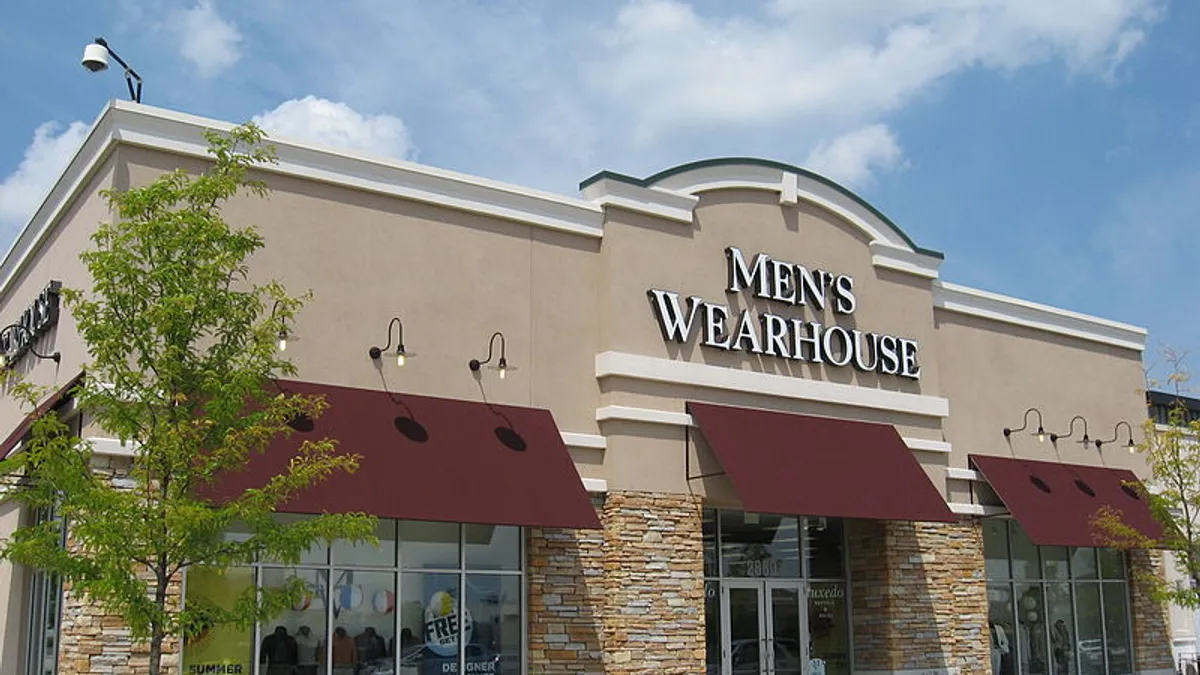Dive Brief:
- Men's Wearhouse owner Tailored Brands said in a securities filing that without additional liquidity it may have to terminate operations or seek bankruptcy protection.
- The filing, released Wednesday, came as the retailer reported first quarter sales were down 60.4% because of the COVID-19 pandemic, according to a company press release.
- After temporarily closing its stores in the response to the pandemic, the company reopened 44% of its fleet, or 634 stores, by June 5.
Dive Insight:
Retailers of all financial profiles have scrambled to maintain cash positions since the COVID-19 crisis began. Distressed retailers have been thrown into chaos or already sought shelter in bankruptcy. With the country reopening, the crucial need for liquidity has not gone away.
Tailored Brands, which along with Men's Wearhouse owns Jos. A. Bank, Moores and K&G, had seen signs of promise before the pandemic threw it off course. Now, Bloomberg is reporting the company is working with advisers on its debt and considering filing for bankruptcy.
After years of declining sales, the retailer said that comparable sales were up 2.4% in February, with all brands comping positive. But then the pandemic started winding through the country and local and regional governments began ordering nonessential businesses, including apparel stores, to close. Tailored Brands closed all of its stores on March 17 and its e-commerce fulfillment centers on March 20.
To free up liquidity during that period, it pushed out payments to vendors, cut salaries, furloughed or temporarily laid off all store employees and the majority of its corporate staff, and drew down $310 million from its credit facility. With that draw, the company ended Q1 with $244.2 million in cash and cash equivalents (a number that dropped to $201.3 million by June 5), and another $88.8 availability under its revolver.
But it may not be enough. Looking at Tailored Brands by banner, comp sales where stores have been open at least one week were down 65% at Men's Wearhouse, down 78% at Jos. A. Bank and down 40% at K&G. E-commerce comps to date for the second quarter are down 32% — not good in an era where apparel retailers are leaning heavily on their digital channels to make up lost store sales.
Without generating cash from sales, the retailer is highly dependent on any capital it can raise. It said in the filing that its liquidity could be further constrained if its bank starts requiring reserves that would cut into the borrowing availability on its asset-based facility. Moreover, if it violates its financial maintenance covenant it could default on the ABL, which could trigger defaults on other debt as well.
How the pandemic will continue to affect the retailer's operations remains "highly uncertain," the company said, pointing to a laundry list of unknowns, including "the duration of the outbreak, new information that may emerge concerning the severity of COVID-19 and the actions, especially those taken by governmental authorities, to contain the pandemic or treat its impact."
If the impact of the pandemic wears on and Tailored Brands can't raise more liquidity, the company said that "we may be forced to scale back or terminate operations and/or seek protection under applicable bankruptcy laws."
CEO Dinesh Lathi said in the release that he expects the company's sales to rebuild "gradually" through 2020. He also said the company had already identified trends toward casualization and in digital marketing that the pandemic has accelerated. He added that "we are pleased to have already made progress transforming our business to address these trends."
With debt of $1.4 billion and liquidity issues, the clock is ticking.
















